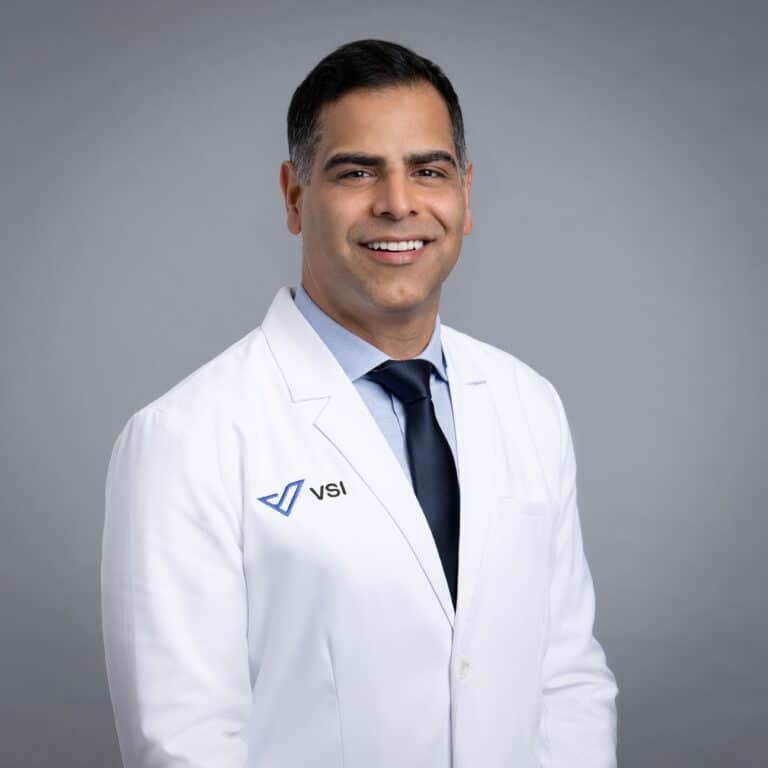
A SURGICAL FIRST: Augmented Reality Guided Personalized Scoliosis Implant Surgery Delivered Using Artificial Intelligence
 .
. 
Virginia Spine Institute surgeons Dr. Ehsan Jazini and Dr. Christopher Good team up to deliver an innovative approach to straighten young girl’s spine
For Immediate Release: RESTON, VA JULY 26, 2021 – Using Artificial Intelligence (AI) and Augmented Reality (AR), top surgeons at Virginia Spine Institute deliver personalized spinal implants to a 17-year-old patient. Spine Surgeons Dr. Ehsan Jazini and Dr. Christopher Good performed the procedure at Reston Hospital Center on Monday, July 26, 2021.
The patient, Lové Earle, a high school junior from Maryland, suffers from a rare and progressive adolescent idiopathic scoliosis, causing her pain and limited mobility. The problem became so bad, she was having trouble carrying her school books. Prior to surgery, Earle was living with a 60-degree spine curvature that showed no improvement even after 6 months of wearing a brace. The cosmetic issues alone were enough for the teen to seek help from Virginia Spine Institute, but without proper treatment, she also risked significant future health issues, including breathing problems and increased pain.
Together, Dr. Jazini and Dr. Good performed a 14-level spinal fusion on Earle using patient-specific UNiD Rods to correct her rare scoliosis and straighten her spine. Unlike conventional spine surgery, these rods are industrially pre-bent prior to surgery, tailored to the patient’s unique anatomy and to accurately match an AI-driven pre-operative surgical plan. The platform allows surgeons to precisely align patients’ spines, reducing the risk of revision surgeries. In conventional spine surgery, surgeons manually bend spine rods in the operating room, leaving larger variabilities in outcomes.
To add to the personalization of the rods, the surgeons used Adaptive Spine Intelligence (ASI) which offers predictive modeling. The system captures preoperative, intraoperative, and postoperative data to improve patient outcomes.
In addition, Dr. Jazini used AR, which gives surgeons x-ray vision during complex surgeries leading to faster, safer, and more precise surgical procedures. Wearing special goggles, AR allows surgeons to conduct spine surgery on patients while simultaneously viewing a hologram of the surgical plan. The headset accurately determines the position of surgical tools and superimposes them on the patient’s vital data, so the doctor doesn’t have to take his eye off the patient.
“Spine surgery is evolving and becoming more personalized”, said Dr. Jazini, “We are excited that we can offer this to our patients, and not only harness the power of these three technologies – AR, AI, and personalized metal implants but to pioneer their combined use and improve outcomes.”
Using these three advanced technologies together allows the surgeons to reduce their time in surgery. This ultimately makes the procedure more efficient, using less radiation on the patient, and optimizing accuracy.
“I always plan meticulously before surgery because there are so many things I need to consider”, explains Dr. Ehsan Jazini, “and now, by combining all three technologies, I can perform this complex procedure with even more precision and customization in the operating room, ensuring the very best outcome for my patient.”
Groundbreaking technologies like the UNiD Rods, AI and AR allow for customized treatments for a variety of patients who are undergoing spine surgery and offer more advanced treatment options than have been available in the past.
Earle is looking forward to her recovery, continuing her studies, getting back to dancing, and taking up acting at the university level.
Topics covered
About the Author
Featured Resources
Insights to Achieve a Pain-Free Life



